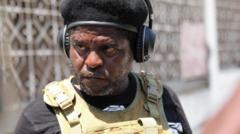El Salvador's decision to not return a man mistakenly deported from the United States underscores shifting political dynamics and human rights concerns in the region.
**El Salvador Refuses to Repatriate Mistakenly Deported Man Amid U.S. Policy Tensions**

**El Salvador Refuses to Repatriate Mistakenly Deported Man Amid U.S. Policy Tensions**
President Bukele's stance highlights ongoing complexities in U.S.-El Salvador relations.
El Salvador has firmly stated that it will not repatriate Kilmar Ábrego García, who was erroneously deported from Maryland back to his home country. This development came during a meeting between President Nayib Bukele and former U.S. President Donald Trump, highlighting the intricate relationship between the two leaders. The U.S. Supreme Court recently mandated that the Trump administration facilitate Mr. Ábrego García's return, but Trump's team insists the decision is ultimately up to El Salvador.
Ábrego García, who has been associated with a prison notorious for its overcrowding and alleged human rights abuses, was among a group of individuals deported under a policy that targets suspected gang members. Attorney General Pam Bondi remarked that the choice lies in Bukele's hands regarding Ábrego’s repatriation. While Trump commended Bukele for the increasing partnership with the U.S., he also noted his interest in potential mass deportations of U.S. citizens to Salvadoran prisons.
The U.S. government's recent admission acknowledges that Mr. Ábrego García was deported due to an "administrative error," yet they maintain claims regarding his alleged gang affiliation—a statement denied by his legal representatives. Ábrego García's wife, Jennifer Vasquez Sura, criticized both administrations for leveraging her husband’s fate as a political tool.
As Bukele continues to accept deportees from the U.S., he benefits politically and financially. For each deportee, El Salvador is reported to receive around $20,000 annually, which could amount to significant funding for the nation’s correctional facilities. Critics of Bukele's policies point out troubling human rights issues, particularly in the context of a state of emergency that has led to mass detentions without proper legal procedures.
Moreover, the ongoing collaboration between the Trump administration and Bukele’s government suggests a possible weakening of U.S. oversight regarding human rights abuses in El Salvador, as the focus shifts to security partnerships. Trump’s praise for Bukele's hard stance on crime reflects this evolving dynamic, raising concerns over the safety and rights of deported individuals.
As this situation develops, both countries will need to navigate the intricate balance between immigration policy, security measures, and humanitarian responsibilities.


















